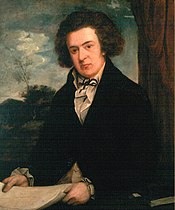Benjamin Smith Barton
| Benjamin Smith Barton | |
|---|---|
 |
|
| Born |
February 10, 1766 Lancaster, Pennsylvania |
| Died | December 19, 1815 (aged 49) New York City, New York |
| Nationality | American |
| Fields | Botany |
| Institutions | University of Philadelphia |
| Notable awards | Magellanic Premium (1804) |
Benjamin Smith Barton (February 10, 1766 – December 19, 1815) was an American botanist, naturalist, and physician.
Barton's father, Rev. Thomas Barton, was an Irish immigrant from Carrickmacross who opened a school near Norristown, Pennsylvania in 1751. His mother was Esther Rittenhouse, sister of astronomer David Rittenhouse.
Between the years 1780-1782, Barton studied at York Academy in Lancaster, Pennsylvania. Two years later, he attended the College of Philadelphia School of Medicine, studying medicine under Dr. Thomas Shippen, and attended Dr. Benjamin Rush's lectures in 1785. Young Barton also accompanied his uncle, David Rittenhouse who had been commissioned to survey the western boundary of Pennsylvania in 1785. The young Barton's travels aroused a lifelong interest in Native Americans. In 1786 Barton transferred to the University of Edinburgh, where he studied for two years before leaving due to financial difficulties, disagreements with two professors, and without a degree. Historians have erroneously claimed that Barton then studied at the University of Göttingen, but this has yet to be verified.
Returning to Philadelphia in 1789, Barton practiced medicine. In 1790 he was elected to a fellowship at Philadelphia's College of Physicians. That same year, he succeeded Adam Kuhn as professor of Natural History and Botany at the College of Philadelphia. The College and its medical school merged with the University of Pennsylvania the following year. Two years later, Barton was also elected as a Fellow of the American Academy of Arts and Sciences. In early 1796 Barton succeeded Samuel Powel Griffitts, and became Professor of Materia Medica. Embarrassed by his lack of credentials, Barton purchased a degree of Doctor of Medicine from the Christian-Albrechts University at Kiel in August 1796. In 1813, Barton succeeded to the professorship of the Theory and Practice of Medicine following the death of Benjamin Rush, even as he continued to lecture in natural history and botany. Concurrently with his academic position, he served as a physician at Pennsylvania Hospital from 1798 through his death in 1815.
...
Wikipedia
